
Source: Andrea Gjestvang / Getty
In a time of protests and two pandemics, social media is teeming with #BlackOut posts, #SayTheirNames stories, and livestreams about the injustices and disparities that exist in the Black community. Everyone from everyday Black people to celebrities has used their platforms to remind followers of the importance of their voice and motivate them to speak out. Seeing solidarity amongst my community has been insightful and inspiring, and it has reinforced my work and existence as a fat Black woman.
However, several white and non-Black, primarily fat, influencers don’t seem to have gotten this memo. There has been an uptick of performativity, manifested in guilt-ridden #BlackLivesmatter rants with no action and empty apologies built into “Call to Action” posts for Black people to teach their oppressors how to acknowledge privilege, analyze 400 years of slavery (and counting), and explain how to show up for their Black friends. This, despite having Google as the best free resource around. But that’s only the tip of the iceberg. Aside from white and non-Black people wanting free lessons and labor from Black people yet again, another situation has been developing: blatant obliviousness.
Yes, Karen et al are still uploading their daily Adobe Lightroom-edited selfies and non-inclusive body-positive graphics as if nothing has changed, and quite frankly, a bish is tired of it. These are the same exact women who have infiltrated fat movements that were undoubtedly established by larger-bodied Black women and garnered their support and subscriptions, only to turn their backs on them. The lack of acknowledgment and reciprocity is beyond me, and the fact that these women and their inactivity continue to discount their fat Black contemporaries is disrespectful.
Despite this, more and more larger-bodied Black women are taking a stance on this issue. I had a conversation with my friend Danni (@amapoundcake) who’s a body image coach and who has always spoken out about the problem with leaving fat, Black women out of the conversation.
“We have to consider the intersectionalities of Feminism, LGBTQ liberation, ect., but the body pos community seems to lack that,” she shared. “I’ve always talked about Blackness as an intersection of the Body positive moment.”
This is why the 27-year-old Fat Activist created an Instagram post calling out several white influencers and challenging their complacency.
“When I noticed white women in this community were silent, I was hurt and angry,” Danni explained. “I made this video addressing them and it sparked a fire. The fact that Breonna Taylor was a fat Black woman who was murdered by the police and all of the body pos folks stayed silent reminded me that they don’t completely see me or other Black Women. Fat Black Women often aren’t seen as victims of all types of violence. That’s a body-positive issue. I decided to make another post, but this time I tagged white women who were silent. I think in many ways that’s how you hold people accountable in this community. Sometimes people don’t know you’re talking to them until you address them directly.”
I couldn’t agree more. Often Black, and particularly fat Black women, are not considered in these situations. We are the heart and soul of social organizing, yet people seem to go mute on anything involving our pain, discomfort, or danger. Breonna Taylor’s death did not receive the same outrage as her male counterparts, which speaks to much larger issues. This is why our voices are valuable and need to be protected. Just as we are the most sought after and co-opted, our advocacy brings about major change in key spaces such as the fashion and beauty industry and, increasingly, social justice. And that is why it’s time to hold white and non-Black, fat influencers accountable for their inaction and performativity.
So, how do we do that? First, they must accept their privilege. Being white and white adjacent grants these women access to certain opportunities that we don’t necessarily have. Yes, they are a part of the fat community. However, this does not absolve them of their anti-Blackness and privilege. Only when they have accepted their privilege and how that affects people who are marginalized can they begin to unpack their contributions to racism, fatphobia, and other oppressions. In addition to this, engaging in performativity by saying they’re down for Black people but don’t use their platform to enact change to support the community does nothing. Silence and performativity are acts of violence, and choosing to behave in this way makes our community much more unheard and invisible. We don’t need their hashtags and your sideline cheers. We need action.
White and non-Black content creators must also support fat Black women and can do so by tagging them in posts pertaining to solidarity, support, and/or resources and reposting content made by and for Black, larger-bodied women. Non-Black influencers can pride themselves on being the “heralds” of body positivity all they want, but the community cannot genuinely pursue size inclusivity without uplifting, honoring, and providing visibility to fat Black women as well.









